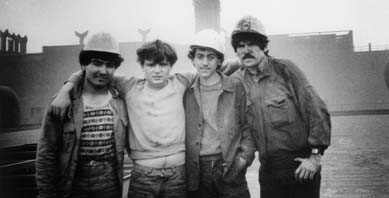On the Beat, Recording Life: Immigrant Lives in Documentaries
Parallel to the wave of feature films that in the 1970s and 1980s dramatized the lives of guest workers in Germany, Austria, and Switzerland, documentarians also set about exposing immigrants' living conditions and their social and cultural conflicts. Like the feature films, these documentaries at first focused primarily on the difficult situation facing foreign workers abroad. "Siamo italiani" (1964), one of the first films of the "New Swiss Cinema," was also one of the first German-language documentaries to deal with Italian immigrant workers in Switzerland; initially invited as cheap labor, they were soon considered by many Swiss citizens as "job stealers". The German documentary "Die Kümmeltürkin geht" (1984/85) centers around a guest worker who is both exploited for her labor and socially segregated until, after years of humiliation and exhausted from the isolation and discrimination she has experienced, she returns to her country. Jörg Gförer's "Ganz Unten" (1986) represents a thematic high-point or end-point for documentaries dealing with the problems of this first immigrant generation. Few films have been so graphic in showing the discrimination against (primarily Turkish) workers. Based on the book of the same name by undercover journalist Günther Wallraff, the film combines surreptitiously filmed documentary material with retroactively conducted interviews to show the shocking everyday working conditions for Turkish day laborers at the Thyssen Steel Works.

The Second Generation Looks Back
While such films were concerned solely with the first immigrant generation, Michael Lentz's "Verländert" (1983) was already focusing on the next one - the non-Germans who were born in Germany and grew up here. In "Verländert", Lentz portrays a girl in a Turkish family who is forced to choose between the traditional way of life of her parents, who want to send her back to Turkey, and a (relatively) self-determined life in Germany, at the cost of severing relations with her parents. The 1990s saw the production of more and more documentaries dealing primarily with the second generation. Sometimes they focus on the family, as in Serap Berrakkarasus's "Töchter zweier Welten" (1990/91) and Seyhan Derin's "Ich bin die Tochter meiner Mutter" (1996), in which the directors describe their own complicated lives "between two cultures." Sometimes they train their sights on society, as in Aysun Bademsoy's "Deutsche Polizisten" (1999), which accompanies young German police officers of non-German origin on the job in neighborhoods with large immigrant populations. Bademsoy's documentary "Mädchen am Ball" (1995), "Nach dem Spiel" (1997), and "Ein Mädchen im Ring" (1996) all deal with young, non-German women whose lifestyles not only are indistinguishable from that of their German friends, but also launch them into traditionally male domains. As football players and boxers, they dream of a future in professional sports. The self-reflexive perspective of these films, all of which are made by women directors who themselves are children of immigrant parents, occasionally expands to take in a view of their parents. Kadir Sözen's "Mein Vater der Gastarbeiter" (1994) and Fatih Akin's "Wir haben vergessen, zurückzukehren" (2000) are attempts to understand the difficult situation their parents faced when they left their own countries to start a new life in a strange land.